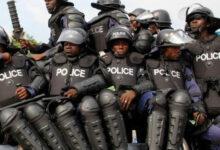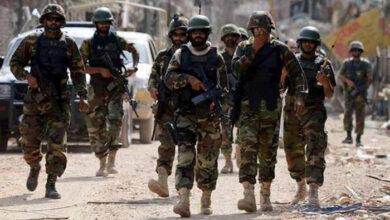
13 Causes of Ethnic Conflict in Nigeria and Solutions
Causes of ethnic conflict in Nigeria are many but we will focus on primary ones that government should deal with to stop the menace at once.
You can trace causes of ethnic conflict to amalgamation, religious differences, inequality, lack of transparent governance, long military incursion in government and lack of vision or Nigerian dream, to mention but a few.
👉 Relocate to Canada Today!
Live, Study and Work in Canada. No Payment is Required! Hurry Now click here to Apply >> Immigrate to CanadaThis article will show that ethnic conflict is bad and discuss factors that we have listed above, and close by giving solutions for stopping ethnic conflict.
13 Causes of Ethnic Conflict in Nigeria
What are the causes of social conflict in Nigeria? Let us discuss …
1) Amalgamation
Amalgamation of the northern and southern protectorates made up of many ethnic groups with different languages and cultures, was an error which Nigeria suffers till date. History show that modern Nigeria came out of the merging of two British colonial territories of southern and northern protectorates in 1914.
The colonialist did it for administrative convenience though they were incompatible neighbors. The north practices Moslem religion while the south is predominantly of Christian faith and traditional religion.
These religious differences have been a source of political disagreements and suspicions between the two regions since colonial times. Moreover, both regions have ethnic and religious minorities holding grievances against three major ethnic groups they see as oppressors.
Due to the over 200 ethnic groups that formed Nigeria, there is division of the nation along tribal lines. Suspicion, hatred, lack of trust and discrimination influence the relationship between the people of different ethnic groups in the country, and deprive Nigeria real national loyalty and unity.
Read Also: The Causes and Effects of Kidnapping in Nigeria
👉 Relocate to Canada Today!
Live, Study and Work in Canada. No Payment is Required! Hurry Now click here to Apply >> Immigrate to Canada2) Tribalism
Tribalism is one of the causes of ethnic conflict in Nigeria. Loyalty to ethnic groups impedes true nationalism and unity of the country.
From the colonial times till date, leaders use ethnic biases to win election and divide the country. Most of the conflicts that take place begin from this ancient ethnic sentiments fueled by selfish political motives.
For example, employment into public office, ministries, agencies and directorates of federal government are mostly for tribal reasons and not competence. When you raise objections it snowballs into ethnic fight.
Tribalism drives a wedge into true brotherhood in the nation and upholds division which causes ethnic conflicts and stops collective efforts to grow the economy. The fact is that tribalism divides the people and fosters Favoritism.
3) Favoritism
You can define Favoritism as preferential treatment. It is the action of somebody in power favoring their relatives and friends especially in appointing them to good positions. This is a source of conflict in the nation, as some people in authority fail to follow rules strictly when it relates to their relatives and friends.
These officials prefer relatives and friends even when they are not qualified for government appointments, positions or carrying out contracts. Based on this, to say that Favoritism produces a corrupt and an inept leader is true.
4) Corruption and Inept Leadership
Corruption and unqualified leaders cause ethnic conflict in Nigeria. Gross mismanagement of national resources and misrule by unqualified leaders, have impoverished and denied opportunities to majority of Nigerians since independence which has led to agitations by citizens.
Clear inequality exists in the way Nigeria shares its federal positions and allocation of infrastructure projects among the federating states.
To create a sense of balance and share appointments and projects fairly, Government established Federal Character Commission but this has not stopped protests since government sometimes fail to use federal character for all appointments, hence the clamor for resource control among other demands.
5) Resource Control
This is one of the causes of ethnic conflict in Nigeria. From 1966, when Isaac Adaka Boro formed a militia group to fight for resource control till date, this issue has been a contentious one in the country.
Resource control is a hot issue which has refused to go away due to environmental degradation of the area and lack of real development in the Niger Delta which makes over 90% of federal revenue for running the economy of the nation.
Late President Umaru Musa Yar’Adua tried to resolve the resource control issue when he gave unconditional amnesty to Niger Delta militants, and offered to train them and rehabilitate the area in exchange for surrendering their weapons.
Although, militants have stopped destroying NNPC pipelines and vandalizing export terminals, the agitation for resource control persists today. Recently another militia force gave an ultimatum to other ethnic groups living in the Niger Delta to go before October 1, 2017.
We should all condemn this extreme stance but the cause is partly due to marginalization of some ethnic groups in the country and wish for more development from the center.
6) Marginalization of Some Ethnic Groups in the Country
Marginalization of some ethnic groups that make up the country is one of the causes of ethnic conflict in Nigeria.
People fighting for ethnic groups have emerged in the recent time such as the Indigenous People of Biafra (IPOB). This group is fighting for the state of Biafra which many Nigerians see as an ideal which can never happen.
Marginalizing the eastern part of the country in the Nigerian project, which was part of the cause of the civil war in 1967-1970, has yet to receive full reparation and attention of successive governments.
Till date, reconciliation, rehabilitation, and restoration of the economy and the people in the east is still ongoing and the wounds of the war has not healed totally after over five decades.
Now, this same issue of marginalization of the IGBO ethnic group is threatening to undermine the peace of the southeast geopolitical zone, as IPOB is demanding for a separate state of Biafra.
The present government is doing its best to find solution to the inequitable distribution of government appointments and projects to the eastern part of the country. It should go further to stamp out marginalization of ethnic groups and start constitutional reforms to stop IPOB’s separatist agenda.
Read Also: The Role of Public Protest on Government Policies
7) Constitutional Reform
The 1999 constitution is widely seen as a military constitution and this document is one of the causes of ethnic conflict in Nigeria.
To replace it, Nigerians are asking for a true constitution prepared by the people and for the people.
Civil society and opinion leaders have repeatedly called on various governments to convene a sovereign national conference to discuss thorny issues in the federal system of government, and make a new constitution, but this has not happened.
President Goodluck Jonathan’s government organized a constitutional conference in 2014 i.e. the CONFAB to discuss issues that cause ethnic wrangling and disunity, and came out with far-reaching resolutions for restructuring the Federal system of government.
Now, government is studying it while the National Assembly has started amending some parts of the 1999 constitution.
The house of Assembly should amend the constitution to deal with the following issues.
To resolve request for true federalism, resource control, rights and privileges of citizens, remove state of origin from our forms, revisit federal character and educationally disadvantaged states quota, review lopsided division of the country into states and unequal creation of local government and states in the six geopolitical zones.
The new constitution should devolve power over resource development and distribution from the central government, to states and local governments to make sure of economic justice and equity.
In addition, the new constitution should define rights and privileges of citizens by the place they live in not by place of origin, and remove bad influence of religion in politics and deal with religious intolerance.
8) Religious Intolerance
Religious bigotry between Christians and Moslems is one of the key causes of ethnic conflict in Nigeria. History shows that religious intolerance was the cause of the Riot that took place in Kano on May 1, 1953 which began a series of violent attacks against non-Muslims in the Country.
Because of strong religious and ethnic hostility, some nationalist believe that amalgamation was a mistake and that Nigeria is a mere geographical expression.
Christian ethnic groups in Southern Nigeria fear the North’s political power which they think they could use to Islamize the country. This suspicion has openly caused religious conflicts where each religious faith targets the other causing revenge killings.
In addition, due to religious differences, Boko Haram Islamist terrorist organization sprang up denouncing western education and culture, and killing and maiming Christians and Muslims alike.
Within the past fifty years some radical groups such as Maitatsine, Darul Islam, and the Shiite movements have risen and caused riots leading to destruction of lives and property. However, Boko Haram which has taken mindless killings and destructions to a sickening level tops them all.
Since Nigeria is a circular state, it should not have considered imposition of Islamic Sharia law on non-Muslims.
9) Introduction of Sharia Criminal Legal System
One of the other crucial causes of ethnic conflict in Nigeria is the introduction of sharia criminal legal system in some parts of Northern Nigeria.
The introduction of Sharia law is one way politicians use religion to create division and gain cheap votes. For example, the former Governor of Zamfara State Alhaji Sani Ahmad Yerima suggested that Zamfara state should adopt sharia criminal legal code in 1999.
This suggestion, led to the starting of Sharia criminal legal system by 12 predominantly Moslem states in the North in year 2000 to 2002, which caused national controversies and led to an outcry by Christians. Christians in the affected states protested and this led to killings and destruction of properties.
After these conflicts, a compromise allowed states with large Muslim populations to set up Islamic courts but limit the use of Sharia to inheritance and family law.
Another spin-off from ethnic conflicts and religious differences is the spate of attacks on innocent farmers by people alleged to be Fulani herdsmen.
10) Herdsmen Attack
Failure by government security forces to stop brazen attacks of one ethnic group over others is a ticking time bomb waiting to explode.
Killings by a group suspected to be Fulani herdsmen in various parts of the country without government sanctions, had given these criminals confidence to go on carrying out these heinous crimes.
Monthly, you hear that herdsmen attacked one community or another sacking it and destroying lives and property.
Until groups that kill other citizens and cause unrest receive adequate punishments for their crime, to serve as deterrent to other groups this unprovoked attacks and killings will continue.
Though you cannot liken herdsmen attack to disputes over ownership of land, we should condemn both.
11) Disputes over Ownership of Land
History has shown that ethnic wars had broken out among people of the same states such as Brass and Nembe communities of Bayelsa and Aguleri and Umuleri of Anambra State.
In these land disputes kith and kin kill themselves cheaply because of tussle over ownership of land.
In 1981, International Boundary dispute erupted when Cameroonian Gendarmes gunned down some Nigerian Soldiers patrolling the Bakassi peninsula. This could have gone into full-scale war but for Nigeria’s maturity, magnanimity and playing the big brother role by not retaliating.
12) Long Military Incursion in Government
Long rule by the military in Nigeria put military psyche into Nigerians.
This affects the way civilians treat themselves with a lot of suspicion and hatred as if they are in a war zone. Civilians have assimilated military behavior and use it in simple disputes between neighbors and this sometimes lead to ethnic conflict.
The show and use of force by some members of the armed forces, police and political office holders, give citizens wrong role models to copy. For example these leaders use Sirens and drive recklessly on our roads as if to say that might is right.
Many Nigerians live under a lot of pressure hence the short fuse that makes little misunderstandings lead to ethnic conflicts, killings and destruction of properties with reckless abandon as if a fellow citizen’s life is worthless as long as it is the other persons’.
Where is the value and sanctity of human life?
You can put the cause of this bad behavior against fellow citizens to long military rule, and partly to lack of a Nigerian Vision or dream.
13) Lack of vision
Because the colonialist formed the country out of diverse ethnic nationalities, there is no ideal to inspire patriotism among citizens. Nigerians sing the national anthem and say the pledge without attaching any deeper meaning to them.
In America, you have the American dream but in Nigeria, there is no vision which citizens fight to uphold. Until we define the Nigerian dream, ethnic crisis may continue to dog the country.
Solutions to the inter ethnic crises in Nigeria
You might want to ask, when will this stop or how can we stop these menace? What are the real solutions to the inter ethnic crises and violence in Nigeria? The answer is not far fetched. Click here to see the article on 10 solutions to the inter ethnic crises and violence in Nigeria.
Conclusion
This article discussed some of the causes of ethnic conflict in Nigeria. What are the solutions?
The solutions to avert future occurrence includes the development of all parts of the country, and practice of justice and equity in the land.
Finally, the use of ethnic and religious sentiments to cause division and conflicts will lose its appeal when you amend the constitution, and government starts fiscal federalism and devolution of power to the states and local government councils.
Conflicts do not do us any good so let us shun them and fight for peace and progress instead.






Well done.This might help me in my home work
It is wonderful summary of analysis on causes and effects of ethnics conflict. In deed, ethnic conflict currently is not only the problem of a certain country but a global issue. Of course, its socioeconomic impacts in underdeveloped and/or developing countries is very much significant. What I want to emphasize is that leaders has to be kin to practice adaptive leadership.
YOU REALLY TRIED. AM PROUD OF YOU!